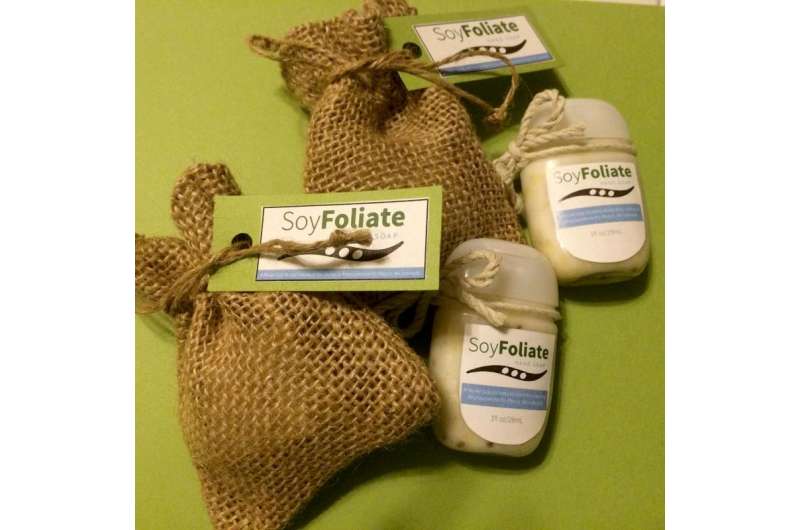Soy microbeads are ecofriendly alternative to plastic microbeads used in cosmetic, soap products

Recent graduates from Purdue University have started a company to further develop and bring to market their SoyFoliate innovation, a soy microbead technology that could offer an environmentally friendly alternative to plastic microbeads that have been banned in the United States.
Samuel Lewis, Steve Ferris and Alison Switzer, recent Doctor of Pharmacy graduates from Purdue's College of Pharmacy, and Ryan Pendergast, a graduate from the School of Mechanical Engineering, founded the company, SoyFoliate.
SoyFoliate's product aims to fill a need in the personal care market for alternative microbead technology. Microbeads are manufactured solid plastic particles commonly used in personal care products for exfoliating. In 2015, President Barack Obama signed a bill restricting conventional plastic microbeads because of their harmful effects on the environment.
"Soy has several biodegradable and hydrophilic properties that make it a great substitute to plastic microbeads. Plastic beads do not absorb water, and soy can over time," Lewis said. "To mitigate the problem we mixed our beads with small amounts of oil to prevent water from saturating the beads and decreasing their rigid properties."
Lewis said the team started a company in order to efficiently bring the product to market.
"We've spent the last year conducting market research, working with industry professionals and experts in the field and getting feedback, which has all been positive," he said. "We plan to be the first ones to market an alternative product used in a huge variety of personal care products."
SoyFoliate plans to move forward with prototyping, stability testing and business development.
"We're working on a prototype to test for shelf stability as well as ensuring it's safe for the environment, features that will make it a consumer preferred option on the market," Lewis said. "We are excited to update our technology with a new formulation that should offer more stability and biodegradability."
SoyFoliate aims to license the technology to personal care companies.
"Our environmentally friendly soy microbeads are a highly marketable alternative to use in personal care products," Lewis said. "We look forward to developing a finalized formulation and product and partnering with both producers and companies who will want to use it in their products."
Technology used by SoyFoliate is licensed through the Purdue Research Foundation Office of Technology Commercialization. The company is a member of the Purdue startup class of 2017.
SoyFoliate's technology received $20,000 from the 2016 Soy Innovation Competition. The company works closely with the Purdue Foundry, an entrepreneurial accelerator located in Discovery Park's Burton D. Morgan Center for Entrepreneurship.
"We've been working with the Purdue Foundry to build a viable product," Lewis said. "Since we're working toward a sublicensing business strategy, the Purdue Foundry has been essential in helping us make contact with industry personnel."
SoyFoliate's founders are seeking more resources to accomplish their goals.
"The biggest thing for us would be lab space," Switzer said. "We need to figure out how to outsource a centralized space even if it's through general lab space or through a partner with our company. This will help us take those next steps to creating a great product."
Provided by Purdue University



















